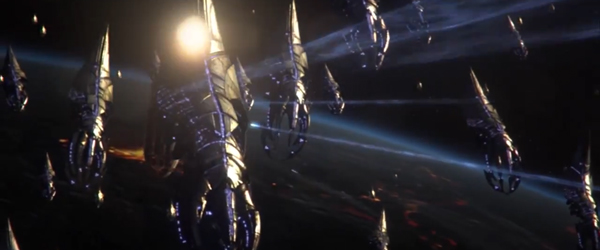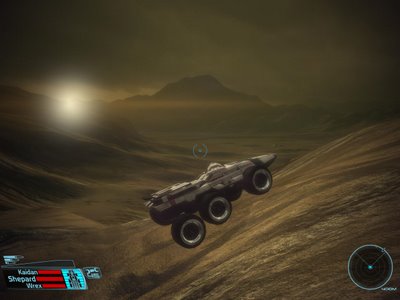This post has not been edited by the GamesBeat staff. Opinions by GamesBeat community writers do not necessarily reflect those of the staff.
It's not easy creating motivation to save an empty, lifeless galaxy. I'm talking about losing the suspension of disbelief, taking out the implied habitations, and looking at the numbers. How many people did you see on earth? Maybe a few dozen marines, bustling through the military complex, and a small gathering of the ruling officers and their lackey's when the Reapers attacked. Then one or dead humans here, a small child there, and then a cityscape with millions of implied lives.

When you start looking at galaxy-wide populations, things get even more underwhelming. The problem is this monkey brain of ours, we just can't conjure up sympathy for that many things. The citadel implies scale and population. I can gaze out towards the distant buildings and atriums, presumably filled with thousands, maybe millions, of habitants. You have to agree to the illusion, you have to want to believe. Because the evidence says otherwise, whether it's the handful of people on the five levels your elevator will take you on the Citadel, or the few dozen scientists rescued and their implied families or the imagined Krogans inhabiting their homeworld, the actual number of aliens and people you see is small.
It's a technical limitation to be sure, our technology can't sustain the number of characters on-screen to properly simulate a crowd, and it's a simple cheat movies, television and games have to get around. But when you put such an impetus on the player, when you start using the word "million" with a "b" you had better be committed to some elaborate illusion. Bioware does admirably, giving us the feeling of scale using the galaxy map, adding lifeless planets around the solar systems in addition to the living ones. But in the end, I just don't buy it. Bioware bites off more than our technology can chew, and everything suffers as a result.

A galaxy full of life
What killed the momentum for me was a moment of eavesdropping. One crew mate extolled the gravity of our situation, wondering how many billions of lives were being lost every day. Millions of souls lost while I shopped on the citadel or talked with Joker and EDI on my ship. The tension is ratcheted up so high it implodes in on itself, that momentum is impossible to keep up, but there's no going back. Anything short of extinction of species is paltry after the first ten minutes of the game, and even the quiet moments suffocate, overshadowed by the need to keep the galactic readiness rising.
There is nowhere to go but up. In mere moments entire races are obliterated, a moment's hesitation, a renegade or paragon twitch-prompt could mean the end of an entire race. Boom, there's another species irrevocably changed forever by my decisions. It's addicting, this feeling of gravity and importance, but ultimately the crescendo of increasingly important actions creates a fever pitch.
I have not finished Mass Effect 3, but without a doubt, I believe Shepherd has to die. We have created a being so monumental, his achievements so astounding, there is nothing left for him to do except ascend to godhood. What could possibly top repelling the Reaper invasion in Mass Effect 4? What could possibly be more threatening than this army of supernatural war-gods bent on our destruction? How could Bioware possibly raise the stakes on all life in the galaxy? The sheer scale of the conflict ensured Shepherd's demise, because he only exists as long as there is interest in the story, and there is only interest with conflict. There can be no conflict, at least interesting conflict, after the Reapers. The headline from Mass Effect 4 cannot be "Shepherd quells Krogan rebellion with paragon dialogue and his shotgun," it has to be bigger than its predecessor or nothing at all.
Mass Effect strives to create scale with some success, but where Bioware truly succeeds is in the small stories. The intimate details of a navy pilot's lifelong struggle with a physical disability, a young quarian seeking to find her place in a strict culture, and a commander fighting against racial prejudice to create unity on his ship.
The scale is sometimes summed up in two, maybe three characters, each with an agenda, differing worldviews and distrust. Bioware, and this is where they shine, weaves us into the conflict between a friends or a neighbour and asks, "What would you say?"
These are the moments when my heart jumps into my throat, these are the decisions that cause us to weigh carefully our actions. Because when momentum pulls us through increasingly higher and higher stakes, we often forget what really matters.
